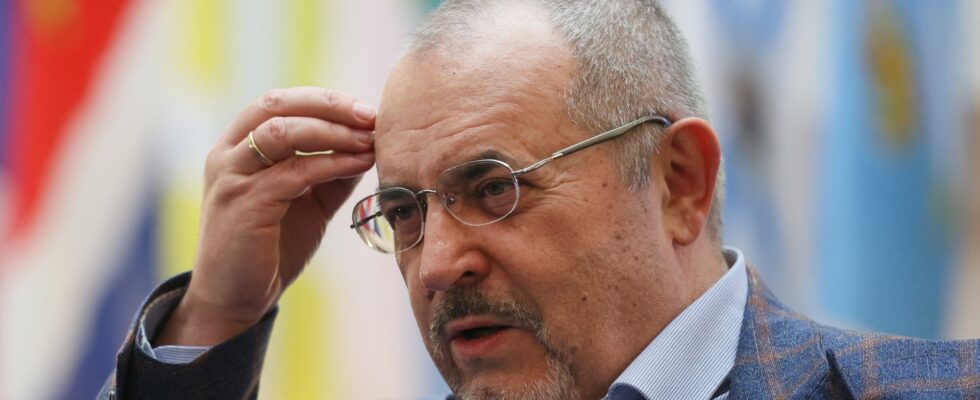Hope or mirage? At 60, Boris Nadezhdine, a discreet veteran of Russian politics, surprised by managing to mobilize crowds of Russians in favor of peace in Ukraine and challenge Vladimir Putin in the presidential election. In a country where criticizing the Kremlin is punishable by prison, his candidacy is a breath of fresh air for anonymous critics of the Russian regime, looking for a way to express themselves without risking their freedom.
“Millions of people support me”
Boris Nadejdine submitted the signatures of more than 100,000 voters supporting him to the Electoral Commission on Wednesday, a necessary step to see his candidacy validated. “Thank you very much to those who believed in us,” he told the press. “No one believed it a month ago, and some still doubted it two weeks ago. Millions of people support me,” he added.
In an interview with AFP at the end of January, he described the offensive against Ukraine as a “nightmare” and denounced Vladimir Putin’s quarter-century of authoritarian drift. A rare thing in Russia today. “My candidacy gives people a unique opportunity to legally protest current policies,” said the sturdy man with a short gray beard and close-cropped hair, whose name refers to the word “hope.”
His electoral promises: to stop the fighting, put an end to the “militarization” of Russia and release “all political prisoners” like the opponent Alexeï Navalny. Others before him went to prison for such comments. So why is he spared? “I don’t know,” he said. But perhaps Putin “does not consider me a terrible threat”, admits the opponent.
A candidacy despised by the Kremlin
The Kremlin does not hide its disdain. “We do not consider him as a competitor,” Dmitri Peskov, spokesperson for the Russian president, told the press. However, Muscovites who came this week to sign their support wonder if the Kremlin is not using this candidacy to give an outlet to the discontented.
Little known outside the tiny liberal circle, the person said he launched in October because no more famous anti-Putin figure had taken the plunge, citing the former mayor of Yekaterinburg, Evgeni Roïzman or even the Nobel Peace Prize winner and head of the opposition newspaper Novaya Gazeta Dmitri Mouratov. “Honestly, I thought someone was going to take the plunge,” he told AFP. Until this campaign, Boris Nadezhdine was confined to the role of whipping boy for the fanatics of the assault on Ukraine who populate the sets of television channels.
“I know it will be hard to beat Putin,” the opponent readily admits. Nevertheless, he hopes for a good score which could mean “the beginning of the end” of the Russian president’s era.
Municipal elected official with a physics degree
Over the past thirty years, Boris Nadejdine has had a rather confidential public career, while playing an advisory role to more well-known figures. Apart from a brief stint as a deputy in the lower house of parliament (2000-2003), his elective functions remained local. Even today, he is a municipal representative in Dolgoprudny, a town located about twenty kilometers from Moscow where he arrived at the end of the 1960s and where he still lives in a modest building from the 1980s.
Born in 1963 in Soviet Uzbekistan, to a mother who was a music teacher of Jewish origin and a Russian physicist, he initially followed in his father’s footsteps. “Fortunately or unfortunately, I sang like a pan (…) so from the start I wanted to become a physicist,” he said in December.
A graduate in physics, then in law, he obtained his first municipal council mandate in Dolgoproudny in 1990. Between 1997 and 1999, according to his official biography, he collaborated with Boris Nemtsov, who would become a leading opponent of Vladimir Putin, until to his assassination in 2015. He also collaborated with Sergei Kirienko, then a liberal Prime Minister who has now become a key figure in the Kremlin.
He says he worked with the Russian president during his first term, but says he broke up in 2003, during the arrest of the opponent and boss of the Yukos oil group, Mikhail Khodorkovsky. “I have been criticizing Vladimir Putin for decades,” recalls Boris Nadejdine, accusing him of having “concentrated too much power in his hands”.
